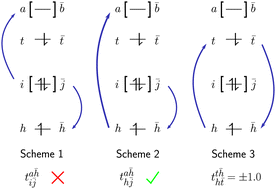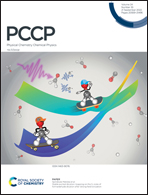Accurate core excitation and ionization energies from a state-specific coupled-cluster singles and doubles approach†
Abstract
We investigate the use of orbital-optimized references in conjunction with single-reference coupled-cluster theory with single and double substitutions (CCSD) for the study of core excitations and ionizations of 18 small organic molecules, without the use of response theory or equation-of-motion (EOM) formalisms. Three schemes are employed to successfully address the convergence difficulties associated with the coupled-cluster equations, and the spin contamination resulting from the use of a spin symmetry-broken reference, in the case of excitations. In order to gauge the inherent potential of the methods studied, an effort is made to provide reasonable basis set limit estimates for the transition energies. Overall, we find that the two best-performing schemes studied here for ΔCCSD are capable of predicting excitation and ionization energies with errors comparable to experimental accuracies. The proposed ΔCCSD schemes reduces statistical errors against experimental excitation energies by more than a factor of two when compared to the frozen-core core–valence separated (FC-CVS) EOM-CCSD approach – a successful variant of EOM-CCSD tailored towards core excitations.

- This article is part of the themed collections: Recent Advances in Modelling Core-Electron Spectroscopy and 2022 PCCP HOT Articles


 Please wait while we load your content...
Please wait while we load your content...